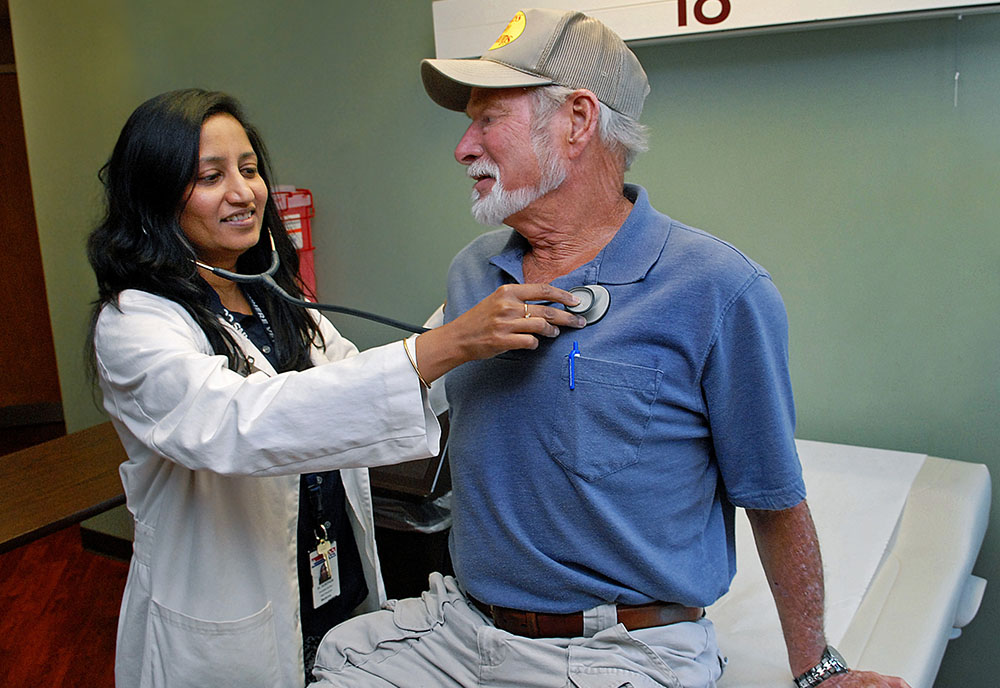Veterans Health Administration
Veterans: Are you at risk for prostate cancer?

Dr. Anuradha Kunthur treats Vietnam era Navy Veteran Harold Sadler.
Except for skin cancer, prostate cancer is the most common cancer in American men.
We asked VA’s Dr. Anuradha Kunthur about the risk factors for prostate cancer. “African American ethnicity, family history of prostate cancer, a diet rich in animal fat, low vegetable intake, obesity and smoking are risk factors for prostate cancer.”
And what can a Veteran do to protect against prostate cancer? “Smoking cessation, weight loss in obese patients, consuming a diet rich in cruciferous vegetables like cabbage, broccoli and limit your intake of animal fat.”
Symptoms?
Dr. Kunthur points out that most of the patients with early stage prostate cancer will not have any symptoms. “Some patients may have frequent urination, urinary urgency, blood in the urine. Although these symptoms are commonly seen in patients with benign prostatic hypertrophy (an increase in the size of the prostate). Patients with bone metastasis may have bone pain.”
Dr. Kunthur is also Assistant Professor in the Department of Hematology/Oncology at the University of Arkansas for Medical Science.
And what is the usual treatment for prostate cancer?
“Patients with prostate cancer are classified as low risk, intermediate risk and high risk categories.
“Patients with localized intermediate grade prostate cancer, with life expectancy of more than 10 years, are treated with radical prostatectomy with lymph node dissection or radiotherapy with external beam radiotherapy with androgen deprivation therapy and brachytherapy.
“High risk patients are treated with external beam radiation therapy with androgen deprivation therapy.
“Low risk patients with life expectancy of less than 10 years can be monitored closely and treated only if there is evidence of progressive disease. Low risk patients with life expectancy of more than 20 years can be either treated with radiation therapy, brachytherapy or radical prostatectomy.
Patients with metastatic disease are treated with androgen deprivation therapy.
“We recommend Veterans discuss with their doctor the pros and cons of prostate cancer screening.”
Is there a test for prostate cancer?
Dr. Kunthur says, “Prostate cancer screening is controversial. Prostate specific antigen (PSA) is a protein produced by the prostate and is sensitive test for prostate cancer. Screening with PSA may reduce the chance of death from prostate cancer and the absolute benefit is small.
“For most men, the potential benefits of screening are outweighed by the risks of the biopsy, over diagnosis and treatment. We recommend that Veterans first discuss with their doctor the pros and cons of prostate cancer screening.
“Patients with high risk of prostate cancer, including African American men and men with family history of prostate cancer may benefit from prostate cancer screening.”
And when should a Veteran start screening for prostate cancer? “For average risk patients, PSA screening should be discussed at age 50 and age 40-45 for men with high risk factors.”
For more in-depth information, here are some valuable frequently asked questions from the Center for Disease Control. How is it diagnosed and treated? More about the screening tests and risk factors.
September is Prostate Cancer Awareness Month. Learn more and live longer.
Veterans who develop prostate cancer and were exposed to Agent Orange or other herbicides during military service do not have to prove a connection between their prostate cancer and service to be eligible to receive VA health care and disability compensation.



















